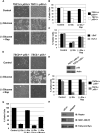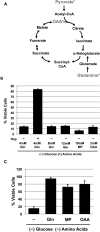Glucose addiction of TSC null cells is caused by failed mTORC1-dependent balancing of metabolic demand with supply
- PMID: 20513425
- PMCID: PMC2896794
- DOI: 10.1016/j.molcel.2010.05.007
Glucose addiction of TSC null cells is caused by failed mTORC1-dependent balancing of metabolic demand with supply
Abstract
The mTORC1-signaling pathway integrates environmental conditions into distinct signals for cell growth by balancing anabolic and catabolic processes. Accordingly, energetic stress inhibits mTORC1 signaling predominantly through AMPK-dependent activation of TSC1/2. Thus, TSC1/2-/- cells are hypersensitive to glucose deprivation, and this has been linked to increased p53 translation and activation of apoptosis. Herein, we show that mTORC1 inhibition during glucose deprivation prevented not only the execution of death, but also induction of energetic stress. mTORC1 inhibition during glucose deprivation decreased AMPK activation and allowed ATP to remain high, which was both necessary and sufficient for protection. This effect was not due to increased catabolic activities such as autophagy, but rather exclusively due to decreased anabolic processes, reducing energy consumption. Specifically, TSC1/2-/- cells become highly dependent on glutamate dehydrogenase-dependent glutamine metabolism via the TCA cycle for survival. Therefore, mTORC1 inhibition during energetic stress is primarily to balance metabolic demand with supply.
Copyright 2010 Elsevier Inc. All rights reserved.
Figures







Comment in
-
A metabolic (re-)balancing act.Mol Cell. 2010 May 28;38(4):481-2. doi: 10.1016/j.molcel.2010.05.008. Mol Cell. 2010. PMID: 20513422
References
-
- Buzzai M, Bauer DE, Jones RG, Deberardins RJ, Hatzivassiliou G, Elstrom RL, Thompson CB. The glucose dependence of Akt-transformed cells can be reversed by pharmacologic activation of fatty acid beta-oxidation. Oncogene. 2005;24:4165–73. - PubMed
Publication types
MeSH terms
Substances
Grants and funding
LinkOut - more resources
Full Text Sources
Other Literature Sources
Molecular Biology Databases
Research Materials
Miscellaneous

